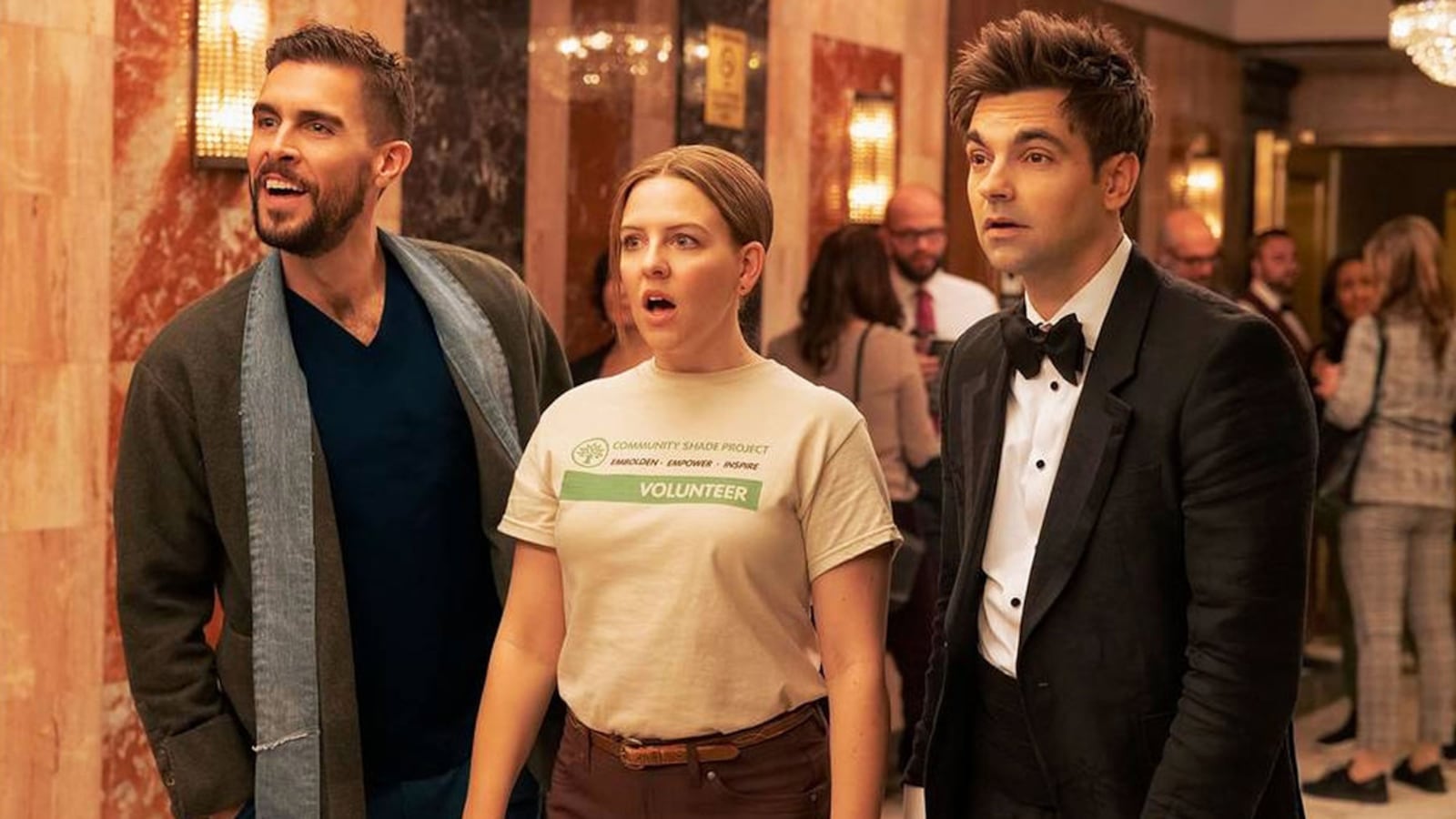There’s a wise saying that goes a little something like this: “A good pop culture reference is hard to find.” Maybe it’s in a book. Or was it just a short story? Surely this quote is a reference to something (maybe a Sufjan Stevens song?); I can’t remember where I heard it. But it is true: fantastic references to our culture, be it books, movies, celebs, music, whatever, are few and far between. That’s why the parodying in The Other Two is so remarkable. The comedy has some of the smartest satirizations and possibly the firmest grasp of the zeitgeist of any TV show airing today. Perhaps even of any sitcom ever made—The Other Two is boldly rivaling 30 Rock at this point.
The plucky HBO Max series, which moved from Comedy Central to the fledgling HBO streamer in 2021, is one of the very few original titles that withstood the many cuts Warner Media made in the lead up to the launch of “Max,” its new streamer. It’s what the show deserves. In fact, Warner’s goofy restructuring seems like something The Other Two would parody. And wouldn’t you know it, they do! In the very first episode of this third season, The Other Two teases the platform it airs on, tossing in a light roast about the hunt for VOD movies amidst a chaotic streaming landscape.
The VOD movie in question is Night Nurse, Cary’s (Drew Tarver) beloved film that ended up as the “most delayed movie” due to the pandemic. When it finally has its premiere, minutes before the title is set to roll on the silver screen, an usher takes the stage to declare that the theater has been sold to Starbucks and the audience must evacuate. This is a grim portrait of the ongoing crisis facing American cinemas —big theaters like the Cinerama Dome and multiple Regal locations have closed in the wake of the pandemic—but it’s also the perfect plot point to kickstart Cary’s arc this season.
Though he’s finally found success (albeit mild) in the acting world, he’s still hungry for more. His pursuit of further acting gigs and fame in New York City leads to riffs on Law and Order, Wes Anderson, and pop culture’s gay best friend trope. We’re going on a third season of the same arc for Cary, the tired actor, but his striving for recognition (in a household with two famous people, lest we forget) never feels overdone. There is almost an entire episode of Cary’s audition attempts this season, and it is riveting. Given the opportunity, I’d watch another 30 minutes of it.

Meanwhile, the “other one,” Brooke (Heléne Yorke), is struggling with married life. Well, maybe not married life—she’s only engaged to on-again-off-again boyfriend Lance (Josh Segarra), but it sure feels like married life. The pandemic has forced Brooke and Lance to spend every last moment together. It’s a major shift for the pair, who spent most of last season ignoring their chemistry and avoiding getting back together, and they’re having a hard time adjusting to their new dynamic.
While Cary endures plenty of fun shenanigans in his acting endeavors, it’s Brooke who takes front and center in this new season of The Other Two. Because Lance has started a new career as a nurse—of course he has, he’s the dream guy—Brooke is thrust into an existential crisis over her career. She loves what she does (entertainment publicity for her family), but she’s stuck in a rut, believing that nothing she works on will have a larger impact on the world. How can you spend 40 hours a week arguing for sponsorship deals, fighting back hordes of hungry fans, and pleasing the two hardest-working people in the world, two A-List celebs who also happen to be your mom and teenage brother?
Pat (Molly Shannon), the show’s spoof of Ellen DeGeneres, now has an entire TV network, and Justin Bieber look-alike Chase (Case Walker) is engaged to Kiernan Shipka. Their storylines take a major backseat to Brooke and Cary this season, but they still are fun bright spots when they are around: While Chase tries to juggle having two relationships at once, Pat hires the equivalent of the Secret Service to keep her safe from her mobs and fans. Then there’s Streeter (Ken Marino) and Shuly (Wanda Sykes), who complicate things when Brooke tries to leave the entertainment industry.
That extra time devoted to Brooke and Cary allows them to become much richer characters in this third chapter of the series. Relationship drama is second only to career drama this season, as Cary wrestles with his inability to connect with his new boyfriend. They can’t talk about anything. That may be because the new BF is constantly method acting, channeling his in sad characters like a closeted teenage boy or a dying man with AIDS while they date. He may be the Jeremy Strong of the queer acting community, but Cary deals with it because he would rather have a connection to the industry through him than not date him at all. It’s certainly hilarious watching Carey's boyfriend reenact Love, Victor and Angels in America in the bedroom, but it also reveals the lengths Cary would go for his career.

Brooke has a similar problem with Lance. She refuses to open up to him about her career anxieties. (Just talk to him! He’s so sweet, he’s almost a puppy!) Instead, she opts to quit and applies for a “good job” planting trees, in order to prove to Lance that she’s a good person just like him. But lying to her fiancé, pretending to enjoy her job, and missing her old life tortures Brooke. Her attempts balance all three at once—showing up at entertainment events while also proving to Lance that her hands are covered in mud from her charity work—creates a joyful comedy of errors. But as the season progresses, Brooke’s arc becomes much more complicated, wading into an existential crisis.

The dramatic turn—which really is still quite funny—shows how deeply The Other Two understands its characters and their motivations. It’s a series with plenty of pop culture references and hokey characters. But underneath the thinly-veiled narcissism, The Other Two has quite a bit of heart. Over the past two seasons, we’ve come to love these deeply flawed, Hollywood-obsessed weirdos. Now, what happens when their struggles become more serious than funny? The answer: We still adore them, and even more, at that.
Liked this review? Sign up to get our weekly See Skip newsletter every Tuesday and find out what new shows and movies are worth watching, and which aren’t.






